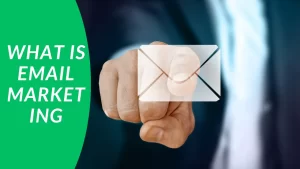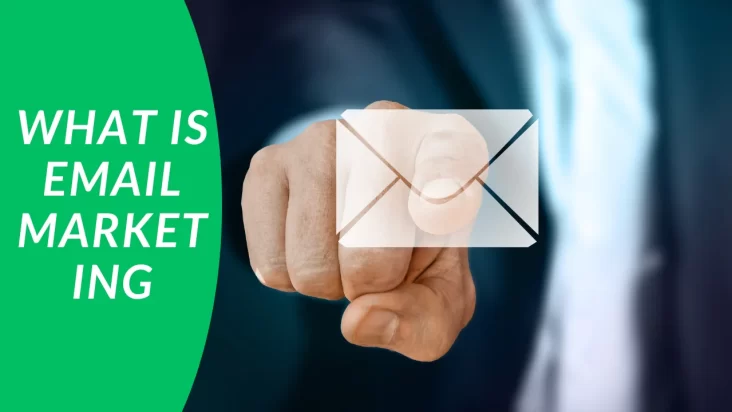In today’s digital age, where social media platforms and messaging apps dominate our communication landscape, email marketing continues to prove its worth as a powerful and effective tool for businesses.
With its ability to directly reach a targeted audience and foster long-term customer relationships, email marketing remains an integral part of any successful marketing strategy.
This article will delve into the world of email marketing, exploring its benefits, best practices, and how to harness its potential to drive engagement, conversions, and business growth.

Using email as part of your marketing strategy is a way to promote your businesss products and services while also encouraging customer loyalty. Email marketing allows you to keep your email subscribers updated on offerings, special discounts and additional services. I
t can also serve as a means to educate your audience about the value of your brand or keep them engaged when they’re not making purchases.
The possibilities are endless! If you want to maximize the return, on investment, for your marketing efforts consider utilizing Mailchimp. With Mailchimp you can create, design and optimize your email marketing campaigns effectively.
Email marketing is a way for businesses to directly connect with customers on their contact list and inform them about products, sales and updates. It plays a role in the inbound strategy of most businesses due, to its high return, on investment (ROI).
In this guide, for beginners we will explore the world of email marketing its functioning and how to begin your journey. By the end you will have an understanding of the fundamentals. Be equipped with the knowledge to implement an effective email marketing strategy for your business.
Email marketing stands out as a cost-efficient direct marketing channel delivering an impressive return on investment. On average businesses earn $42 for every $1 invested in this strategy.
Considering this advantage, it is crucial to incorporate email as an element in your digital marketing plan. Neglecting email marketing would be akin to leaving money untouched on the table.
However if you find yourself unsure about where to start don’t worry; it’s completely normal. Email marketing is a field that can overwhelm beginners with its multitude of tools, techniques and terminologies.
Stay with us to explore everything you need to know about email marketing and gain insights, along the way.
What is email marketing?
Email marketing is a way to promote your business and connect with customers. It falls under the umbrella of digital marketing utilizing email to spread the word, about your products or services.
By incorporating it into your marketing automation efforts you can keep customers informed about your offerings and special deals.
Additionally email marketing plays a role in lead generation building brand awareness fostering relationships, with customers and keeping them engaged when they’re not making immediate purchases. Various types of marketing emails help achieve these goals.
What are the advantages of email marketing?
Email marketing has gained popularity among businesses due, to its features. One of the advantages is that it compels recipients to take action upon receiving an email whether its reading, deleting or archiving it.
The beauty of email marketing lies in its ability to establish a connection with your target audience while simultaneously driving traffic to your blog, social media platforms or any other desired destination. Moreover you can personalize your emails. Tailor them based on demographics ensuring that recipients only receive the messages they are most interested in.
Another benefit of email marketing is the opportunity to conduct A/B tests on lines or call to action statements. This enables you to determine which message performs best and optimize your campaigns accordingly. You can easily manage all these aspects using email marketing software like Mailchimp, which provides a range of templates and tools, for email campaigns.
What are the disadvantages of email marketing?
Although email marketing is often seen as a means of connecting with customers generating leads and nurturing vital business connections it does come with a few drawbacks. In fact numerous businesses are now exploring communication methods such, as EZ Texting. Let’s take a look, at some of the disadvantages associated with email marketing campaigns.
Understanding Email Marketing
Email marketing involves sending commercial messages to a group of people via email. It serves various purposes, such as promoting products, sharing valuable content, building brand awareness, and nurturing customer relationships. Unlike other marketing channels, email marketing allows businesses to directly communicate with their audience in a personalized and controlled manner.
The Benefits of Email Marketing
Targeted and Personalized Communication: Email marketing enables businesses to segment their audience and deliver tailored content based on subscribers’ preferences, behaviors, and demographics. This personalized approach fosters stronger connections, enhances engagement, antd increases the likelihood of conversions.
Cost-Effectiveness: Compared to traditional marketing channels, email marketing offers a cost-effective solution. With minimal overhead costs, businesses can reach a large audience at a fraction of the price incurred through print or broadcast advertising.
Measurable Results: Email marketing provides valuable metrics and analytics, allowing businesses to track open rates, click-through rates, conversion rates, and other key performance indicators. These insights empower marketers to refine their strategies, optimize campaigns, and achieve better results.
Automation and Efficiency: Email marketing platforms offer automation features that streamline the process of sending targeted emails. Automated workflows, such as welcome series, abandoned cart reminders, and birthday emails, save time, maintain consistency, and deliver timely and relevant content to subscribers.
Understanding Email Marketing:
Building a Quality Email List: Focus on growing an engaged and opt-in email list. Encourage website visitors, social media followers, and customers to subscribe by offering incentives, exclusive content, or special promotions. Avoid purchasing email lists to maintain deliverability and avoid legal issues.
Crafting Compelling Content: Create captivating subject lines and engaging email content that provides value to your subscribers. Offer relevant information, exclusive offers, or educational content to keep your audience interested and eager to open your emails.
Mobile Optimization: With the rise of mobile usage, ensure your emails are mobile-friendly and responsive. Optimize your design, use clear and concise copy, and place key information and calls-to-action strategically to ensure a seamless experience on various devices.
A/B Testing: Experiment with different elements of your emails, such as subject lines, calls-to-action, visuals, and content placement. A/B testing helps you identify what resonates best with your audience and optimize your email campaigns accordingly.
Personalization and Segmentation: Leverage the power of data to segment your email list and deliver personalized content. Tailor your emails based on subscriber preferences, past interactions, purchase history, or demographic information to enhance relevance and engagement.
Email Deliverability: Maintain a healthy sender reputation to ensure your emails land in the inbox and not the spam folder. Implement proper email authentication, regularly clean your email list, and avoid spam triggers such as excessive use of capital letters or misleading subject lines.
Email Marketing Trends to Watch:
Interactive Emails: Incorporating interactive elements like GIFs, polls, quizzes, and surveys can boost engagement and create memorable experiences for subscribers.
Hyper-Personalization: Advancements in data analysis and AI technologies enable businesses to deliver hyper-personalized emails that cater to each subscriber’s specific preferences and needs.
Automated Email Sequences: Marketers are increasingly using automated email sequences to nurture leads and guide them through the customer journey. These sequences are designed to deliver targeted messages at the right time, increasing the chances of conversion.
User-Generated Content: Leveraging user-generated content (UGC) in email campaigns adds authenticity and credibility. Encourage subscribers to share their experiences, testimonials, or photos related to your products or services, and showcase them in your emails.
Data Privacy and GDPR Compliance: As data privacy regulations become stricter, it is crucial for businesses to ensure compliance with regulations such as the General Data Protection Regulation (GDPR). Obtain proper consent from subscribers, provide clear opt-out options, and handle customer data securely to maintain trust and avoid legal issues.
Overcoming Email Marketing Challenges
Email Deliverability: With evolving spam filters and email provider algorithms, ensuring high deliverability rates can be challenging. Implement best practices such as authentication protocols, list hygiene, and avoiding spam triggers to improve deliverability.
Inbox Overload: In a crowded inbox, it is essential to stand out. Craft compelling subject lines, use personalization, and create valuable content to grab subscribers’ attention and encourage them to open your emails.
Mobile Optimization: As mobile usage continues to soar, optimizing emails for mobile devices is critical. Test your emails across various screen sizes and email clients to ensure a seamless experience for mobile users.
Email Fatigue: Bombarding subscribers with frequent or irrelevant emails can lead to fatigue and increased unsubscribe rates. Strike a balance by sending targeted and valuable content at a frequency that aligns with your subscribers’ preferences.
Engagement and Growth: Keep your email list engaged by regularly providing valuable content, exclusive offers, and incentives. Focus on list growth strategies to continually expand your subscriber base and maintain a healthy email list.
Email marketing remains a potent tool for businesses to directly connect with their audience, nurture relationships, and drive conversions. By understanding its benefits, implementing best practices, and staying updated with emerging trends, businesses can unlock the full potential of email marketing. Remember to focus on targeted and personalized communication, optimize for mobile devices, leverage automation, and prioritize data privacy to achieve success in your email marketing endeavors. With a strategic approach and continuous refinement, email marketing can become a cornerstone of your marketing strategy, enabling you to build a loyal customer base and drive sustainable business growth.

